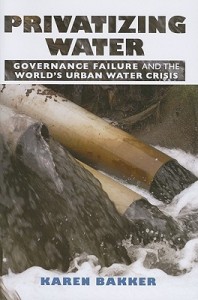A Review of Privatizing Water: Governance Failure and the World’s Urban Water Crisis by Karen Bakker. Ithaca, NY: Cornell University Press, 2010.
In January of 2000, protests broke out in Cochabamba, Bolivia, in response to the skyrocketing price of water. Citizens saw their water bills triple or quadruple just weeks after the municipal water supply was handed over to a private company. Millions of poor city residents went on strike, shutting down Cochabamba for four days. The protesters called for universal water rights, using slogans like “Water Is God’s Gift and Not A Merchandise,” and eventually succeeded in forcing the government to revoke its hated legislation.
The Cochabamba protests are part of a global campaign for a human right to water. Vandana Shiva, a vocal opponent of water privatization, has said that “buying and selling [water] for profit … denies the poor of their human rights.” Conversely, institutions like the World Bank and International Monetary Fund have vigorously urged developing nations to privatize, asserting that market strategies can most efficiently extend water to the poor and ensure water conservation. The introduction of private management to the water sector during the past two decades has generated fierce, polarizing controversies worldwide. Continue reading Beyond Water Privatization: Deconstructing the Public-Private Binary and Considering Alternatives







